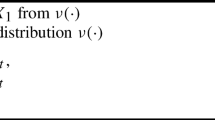Abstract
Recently it was shown by Nesterov (2011) that techniques form convex optimization can be used to successfully accelerate simple derivative-free randomized optimization methods. The appeal of those schemes lies in their low complexity, which is only Θ(n) per iteration—compared to Θ(n 2) for algorithms storing second-order information or covariance matrices. From a high-level point of view, those accelerated schemes employ correlations between successive iterates—a concept looking similar to the evolution path used in Covariance Matrix Adaptation Evolution Strategies (CMA-ES). In this contribution, we (i) implement and empirically test a simple accelerated random search scheme (SARP). Our study is the first to provide numerical evidence that SARP can effectively be implemented with adaptive step size control and does not require access to gradient or advanced line search oracles. We (ii) try to empirically verify the supposed analogy between the evolution path and SARP. We propose an algorithm CMA-EP that uses only the evolution path to bias the search. This algorithm can be generalized to a family of low memory schemes, with complexity Θ(mn) per iteration, following a recent approach by Loshchilov (2014). The study shows that the performance of CMA-EP heavily depends on the spectra of the objective function and thus it cannot accelerate as consistently as SARP.
Access this chapter
Tax calculation will be finalised at checkout
Purchases are for personal use only
Preview
Unable to display preview. Download preview PDF.
Similar content being viewed by others
References
Polyak, B.: Introduction to Optimization. Optimization Software - Inc. (1987)
Nesterov, Y.: Introductory Lectures on Convex Optimization. Kluwer (2004)
Broyden, C.G.: The Convergence of a Class of Double-rank Minimization Algorithms 1. General Considerations. IMA J. of Appl. Math. 6(1), 76–90 (1970)
Fletcher, R.: A new approach to variable metric algorithms. The Computer Journal 13(3), 317–322 (1970)
Goldfarb, D.: A Family of Variable-Metric Methods Derived by Variational Means. Mathematics of Computation 24(109), 23–26 (1970)
Nocedal, J.: Updating Quasi-Newton Matrices with Limited Storage. Mathematics of Computation 35(151), 773–782 (1980)
Liu, D.C., Nocedal, J.: On the limited memory BFGS method for large scale optimization. Mathematical Programming 45(1-3), 503–528 (1989)
Nesterov, Y.: A method of solving a convex programming problem with convergence rate O(1/k 2). Soviet Mathematics Doklady 27(2), 372–376 (1983)
Nesterov, Y.: Smoothing technique and its applications in semidefinite optimization. Mathematical Programming 110(2), 245–259 (2007)
Tseng, P.: On accelerated proximal gradient methods for convex-concave optimization. Submitted to SIAM Journal on Optimization (2008)
Schumer, M., Steiglitz, K.: Adaptive step size random search. IEEE Transactions on Automatic Control 13(3), 270–276 (1968)
Rechenberg, I.: Evolutionsstrategie; Optimierung technischer Systeme nach Prinzipien der biologischen Evolution. Frommann-Holzboog (1973)
Mutseniyeks, V.A., Rastrigin, L.A.: Extremal control of continuous multi-parameter systems by the method of random search. Eng.Cyb. 1, 82–90 (1964)
Stich, S.U., Müller, C.L., Gärtner, B.: Optimization of convex functions with Random Pursuit. SIAM Journal on Optimization 23(2), 1284–1309 (2013)
Nesterov, Y.: Random Gradient-Free Minimization of Convex Functions. Technical report, ECORE (2011)
Leventhal, D., Lewis, A.S.: Randomized Hessian estimation and directional search. Optimization 60(3), 329–345 (2011)
Stich, S.U., Gärtner, B., Müller, C.L.: Variable Metric Random Pursuit (2012) (submitted), http://arxiv.org/abs/1210.5114
Hansen, N., Ostermeier, A.: Completely Derandomized Self-Adaption in Evolution Strategies. Evolutionary Computation 9(2), 159–195 (2001)
Hansen, N., Muller, S.D., Koumoutsakos, P.: Reducing the time complexity of the derandomized evolution strategy with covariance matrix adaptation (CMA-ES). Evol. Comput. 11(1), 1–18 (2003)
Knight, J.N., Lunacek, M.: Reducing the Space-time Complexity of the CMA-ES. In: GECCO 2007, pp. 658–665. ACM (2007)
Loshchilov, I.: A Computationally Efficient Limited Memory CMA-ES for Large Scale Optimization. To appear GECCO (2014), http://arxiv.org/abs/1404.5520
Lee, Y.T., Sidford, A.: Efficient accelerated coordinate descent methods and faster algorithms for solving linear systems. In: FOCS, pp. 147–156. IEEE (2013)
Ostermeier, A., Gawelczyk, A., Hansen, N.: Step-size adaptation based on non-local use of selection information. In: Davidor, Y., Männer, R., Schwefel, H.-P. (eds.) PPSN 1994. LNCS, vol. 866, pp. 189–198. Springer, Heidelberg (1994)
Igel, C., Suttorp, T., Hansen, N.: A Computational Efficient Covariance Matrix Update and a (1+1)-CMA for Evolution Strategies. In: GECCO, pp. 453–460 (2006)
Sun, Y., Schaul, T., Gomez, F., Schmidhuber, J.: A linear time natural evolution strategy for non-separable functions. In: Proc. 15th Genetic and Evolutionary Computation Conference Companion, pp. 61–62. ACM (2013)
Stich, S.U.: Supplementary Online Mat (2014), http://arxiv.org/abs/1406.2010
Stich, S.U., Müller, C.L.: On Spectral Invariance of Randomized Hessian and Covariance Matrix Adaptation Schemes. In: Coello, C.A.C., Cutello, V., Deb, K., Forrest, S., Nicosia, G., Pavone, M. (eds.) PPSN 2012, Part I. LNCS, vol. 7491, pp. 448–457. Springer, Heidelberg (2012)
Author information
Authors and Affiliations
Editor information
Editors and Affiliations
Rights and permissions
Copyright information
© 2014 Springer International Publishing Switzerland
About this paper
Cite this paper
Stich, S.U. (2014). On Low Complexity Acceleration Techniques for Randomized Optimization. In: Bartz-Beielstein, T., Branke, J., Filipič, B., Smith, J. (eds) Parallel Problem Solving from Nature – PPSN XIII. PPSN 2014. Lecture Notes in Computer Science, vol 8672. Springer, Cham. https://doi.org/10.1007/978-3-319-10762-2_13
Download citation
DOI: https://doi.org/10.1007/978-3-319-10762-2_13
Publisher Name: Springer, Cham
Print ISBN: 978-3-319-10761-5
Online ISBN: 978-3-319-10762-2
eBook Packages: Computer ScienceComputer Science (R0)




